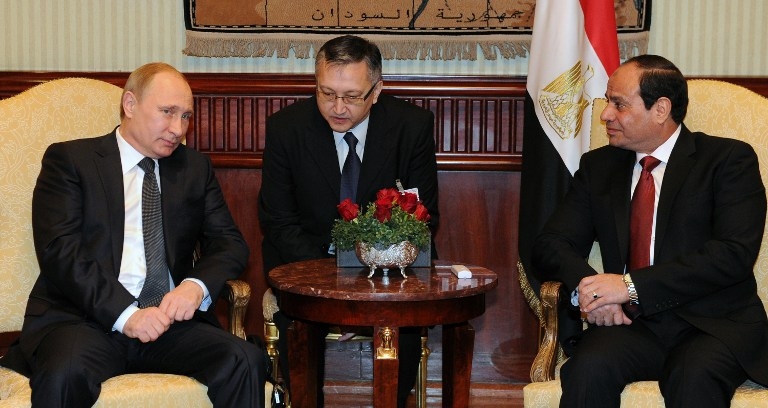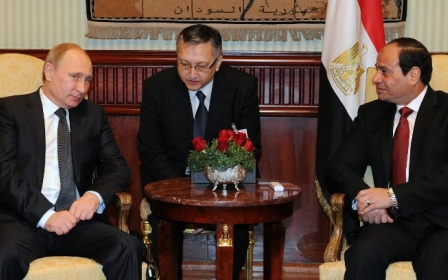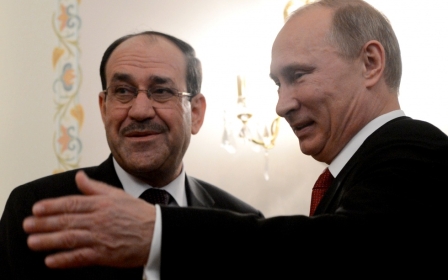ANALYSIS: Did US open door for Putin in the Mideast?

NEW YORK, United States - Officially, the United States is not peeved. Not one bit.
Russian President Vladimir Putin’s red-carpet treatment as he struck trade and nuclear energy deals in Egypt this week was just day-to-day diplomacy, according to US State Department spokeswoman Jen Psaki.
“We certainly understand that countries out there have a range of relationships,” she told reporters on Tuesday.
Putin’s visit to Egypt came at a time when Washington has tense relations with Moscow, over the crisis in Ukraine, and with the increasingly-authoritarian government of Egyptian President Abd-al-Fattah al-Sisi.
It featured a 21-gun salute, an opera visit, dinner at the 187-metre Cairo Tower and highways adorned with Putin posters. The pomp was only slightly marred by an Egyptian brass band’s grating rendition of the Russian national anthem.
“It was a theatrical trip. Putin travels the world, showing the West he’s no pariah. Sisi could signal not that he’s turning away from the US, but that he has other options.” Anna Borshchevskaya, an analyst at The Washington Institute for Near East Policy, told Middle East Eye.
The pair inked deals on trade, investment and building a nuclear power plant, agreed to boost tourism and set up a Russian industrial zone near the Suez Canal. Putin spoke of doubling Egypt-Russia commerce to $5 bb this year.
They even discussed trading in roubles rather than dollars.
Meanwhile, US-Egypt relations have slumped. Washington is ever-more critical of Sisi’s crackdown on opponents since he seized power in 2013 – overshadowing last year’s positive overtures from the US by resuming a $1.5 bn annual aid package and delivering Apache helicopters.
“By withdrawing support to its ally in Egypt, the US opened opportunities for Putin, an anti-Western player, to gain influence at the expense of US interests,” added Borshchevskaya, an expert in Moscow’s policy in the Middle East.
As Sisi hosted a powerful foreigner, Putin’s visit resonated in Russia too. Boris Shmelyov, a Moscow-based scholar connected to Russia’s Foreign Ministry spoke of a “new era in cooperation” for the two nations.
“We are fighting a new Cold War. In this new political situation, Russia doesn’t concede its own relationship with Egypt as a part of the struggle against Washington,” he told MEE. “The relationship between Russia and Egypt had and has its own logic.”
For Putin, it preceded a visit to Belarus on Wednesday to meet European leaders over a conflict in east Ukraine that has claimed some 5,400 lives. Western sanctions over Moscow’s alleged backing of Ukrainian rebels, coupled with low oil prices, have tanked Russia’s economy.
Beyond the political showmanship in Cairo, there are real indicators of stronger Egypt-Russia ties. There are now some 400 Russian firms in Egypt; 3 million out of the 10 million Russians who went abroad in 2014 visited the Land of the Pharaohs.
But progress is patchy. Last year, Moscow and Cairo inked a $3bn deal for Russian military gear, including MiG-29 fighters, which has not been fulfilled. Putin’s gift to Sisi in Cairo this week – a Kalashnikov AK-47 rifle – was noted for its symbolism.
Likewise, the planned nuclear plant in Dabaa on the Mediterranean coast would be Egypt’s first such facility. Cairo first took steps to build a plant there in the early 1980s, but it was scrapped after the Chernobyl disaster in Ukraine in 1986.
“Even expanded trade between Egypt and Russia will not have a significant impact on either economy,” Apostolos Bantis, a Dubai-based expert on emerging markets at Commerzbank, told MEE on Wednesday.
“Russia seeks to dominate the defence market in North Africa. For Putin, this was about strengthening his political and economic base in Egypt and to use it strategically to access Sudan, Ethiopia and Libya.”
For William Pomeranz, deputy director of the Kennan Institute for Advanced Russian Studies, Russia’s economic recession, high interest rates and a rouble that has plunged 50 percent against the dollar, lacks appeal.
“Putin wants to live up to his self-created reputation as big major global player, going to places where he will be welcomed, but he doesn’t arrive with a lot of financial resources to alleviate the economic problems they face there,” he told MEE.
“The re-emerging right-wing authoritarian governments of the Middle East prefer to deal with international partners that won’t question their domestic politics. Russia does not meddle in the internal affairs of others, unlike the US and the European Union.”
New MEE newsletter: Jerusalem Dispatch
Sign up to get the latest insights and analysis on Israel-Palestine, alongside Turkey Unpacked and other MEE newsletters
Middle East Eye delivers independent and unrivalled coverage and analysis of the Middle East, North Africa and beyond. To learn more about republishing this content and the associated fees, please fill out this form. More about MEE can be found here.




